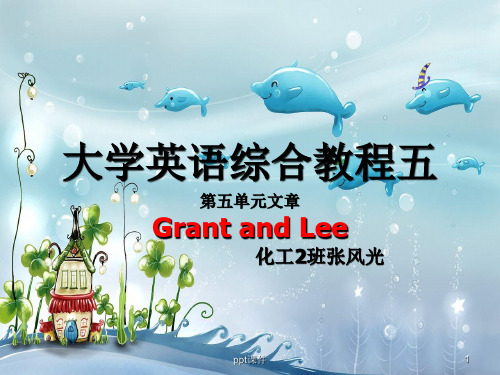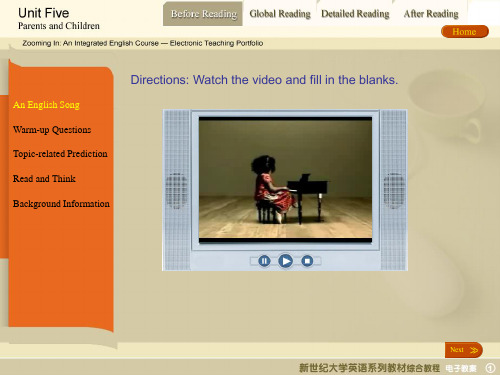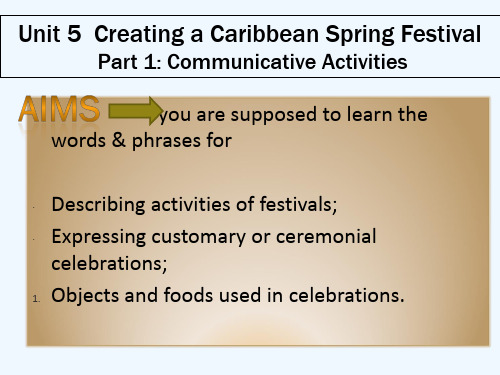大学英语综合教程第五册第五单元 ppt
- 格式:ppt
- 大小:681.00 KB
- 文档页数:17






Unit 5 The American Civil WarⅠ. Suggested Teaching PlanStudents will be able to:1.grasp the main idea and structure of the text;2.learn how to use comparison and contrast in expository writing as well as transitionaldevices in the text;3.master the key language points and grammatical structures in the text;4.conduct a series of reading, listening, speaking and writing activities related to the themeof the unit.1.T asks Ss the following questions on the recording: (5 minutes)—How did the two generals differ in their appearance and dress? (Grant was shorter, younger, brown-haired, tattered and careless in his dress, without a sword; Lee was taller, older, gray-haired, meticulous in his dress, carrying a fine sword.) —What request did Lee make after he reviewed the surrender terms? (He asked that the Cavalry and Artillery men of the Confederate Army should keep their horses.)2.Ss do Cloze B and Translation in after-text exercises to learn more about the differentbackgrounds of Grant and Lee. T may not necessarily ask Ss to use the words and phrases given in the box of Translation, as afterwards they can further revise. (30 minutes)3.Based on the above two activities, Ss come up with several descriptive nouns or adjectivesto summarize the characteristics of Lee and Grant (e.g. aristocrat vs. commoner). (5minutes)1.Ss do Text Analysis Exercise 1, and then T dictates to them the main ideas of the threeparts. (10 minutes)2.T explains the language points in Part I and has Ss practice them, (see Language Study)(10 minutes)3.T asks Ss to scan Part II to locate the introduction paragraph and conclusion paragraphherein (Para 3 and Para 12, respectively). Then T calls their attention to the transitional devices used by the author here. (10 minutes)4.Ss finish Text Analysis Exercise 3. (5 minutes)5.T explains the language points in Part II and has Ss practice them, (see Language Study)(25 minutes)6.T asks Ss to scan Part III and tell what Grant and Lee had in common. Then again T asksthem to note the transitional devices used in this part. (10 minutes)7.T explains the language points in Part III and has Ss practice them, (see LanguageStudy) (15 minutes)1.Discussion and out-of-class research: (20 minutes)1)Ss spend some time in class discussing in groups what Grant and Lee might do afterthe war, based on each person’s background, beliefs, previous experiences, etc.2)Several groups report to class.3)Ss form groups to do an out-of-class research project to find out what actuallyhappened to Grant and Lee after the Civil War.4)T may check on their research results during the next meeting.2.T guides Ss through some after-text exercises. (30 minutes)3.T checks on Ss’ home read ing (Text B). (3 minutes)4.Ss do Part IV: Theme-Related Language Learning Tasks. (1 period)5.T asks Ss to prepare for the next unit: (2 minutes)1)do the pre-reading task;2)preview Text A.Ⅱ. Cultural Notes1. Ulysses S. Grant (1822-1885): the general who commanded the US Army during the CivilWar and later became the 18th President of the US (1869-1877). His greatest Civil War victory was at Vicksburg, Mississippi, and he accepted the surrender of Robert E Lee at Appomattox Court House. Grant was a Republican. He was not a successful president because he failed to stop the illegal actions of some of the friends he had appointed to office. His two volumes of personal memoirs are among the best military books ever written.2. Robert E. Lee (1807-1870): the leader of the armies of the Confederate States during the American Civil War. He was respected for his honor and kindness. General Lee won many battles against the larger Union armies, including the second battle of Bull Run and Chancellorsville. He lost at Gettysburg, however, and soon afterwards surrendered to General Grant at Appomattox Court House. Before the Civil War, President Lincoln asked him to lead the US armies, but Lee was loyal to his state of Virginia and joined the South. After the war, he became president of Washington College, later renamed Washington and Lee College.3. Confederacy: the 11 southern states that left the Union in 1861 to form a new nation. This caused the American Civil War. The President of the Confederate States was Jefferson Davis and their capital city was first Montgomery, Alabama and later Richmond, Virginia. The Confederate States, in their order of leaving the Union, were South Carolina, Mississippi, Florida, Alabama, Georgia, Louisiana, Texas, Virginia, Arkansas, Tennessee and North Carolina.4. Appomattox Court House: a former small community in the state of Virginia where the American Civil War ended. General Robert E Lee of the Confederate States surrendered on 9 April 1865 to General Ulysses S Grant in a private house. The area is now a national historical park.5. the battle of Chancellorsville: a major battle (1-5 May 1863) fought in Virginia during the American Civil War. The South, led by Robert E Lee and Thomas Stonewall Jackson, defeateda large northern army. More than 30,000 soldiers died in the battle, including Jackson himself.6. Vicksburg: a city on the Mississippi River in the state of Mississippi. During the Civil War it was captured by the army of General Grant after a seven-month siege. This gave the Union control of the river and split the Confederate States. The Vicksburg National Military Park is a popular tourist attraction today.Ⅲ. Language Study1.chapter: any distinct period in history or in a person’s life; a subdivision of a written work; usually numbered and titledExamples: The whole period leading up to the revolution is an interesting chapter in British history.He began a new chapter in life when he entered university.Chapter six is all about the solar system.2. to be sure: admittedly, I can’t denyExamples: To be sure, the SARS epidemic has brought about some negative effect on oureconomy.To be sure, there exist some differences between men and women.3. vainly: unsuccessfully; uselesslyExamples: He tried vainly to make them listen to him.If this fighting finally brings peace to the area, the soldiers will not have died vainly. 4. in effect: in fact, although perhaps not appearing soExamples: The two viruses are, in effect, identical.It sounds as if I am getting a pay rise, but in effect I’m losing money.5. write out: write (sth. formal); write especially in a full and complete formExamples: It’s just in note form but I’ll write it out prope rly for you later.If you wait a minute, I’ll write you out a receipt.6. poignant: deeply moving, highly emotional; producing a sharp feeling of sadness Examples: The picture awakens poignant memories of happier days.It is especially poignant that he died the day before his wedding.7. collision: the act of coming into disagreement or striking togetherExamples: The play represents the collision of three generations.Two drivers were killed in a direct collision between a car and a taxi last night.8. embody: representExamples: She embodied good sportsmanship on the playing field.His song embodied the spirit of the age.9. ownership: the right or state of being an ownerExamples: Do you have any proof of ownership of / for this car?The enterprises were transferred out of public and into private ownership.10. key: adjust; lock with a keyExamples: The books are keyed to the interests of very young children.I taught my daughter how to key the door.11. bring forth: give rise to; produceExamples: Why di dn’t you bring forth your suggestion at the meeting yesterday?Lots of trees bring forth fruit.12. solemn: deeply earnest; serious; grave; formalExamples: I give you my solemn promise that I will do everything I can to help you.Her solemn little face broke into smiles. The memorial service was a very solemnoccasion.13. obligation: sth. which must be done because of a duty or promiseExamples: If you have not signed a contract, you are under no obligation to pay them any money.You have a legal obligation to ensure your child receives a proper education.14. leadership: the body of people who lead a group; the activity of leading; the ability to leadExamples: There is growing discontent with the leadership.The election for the leadership of the council will take place on Tuesday.The group flourished under her firm leadership.He lacks leadership qualities.15. virtue: any admirable qualityExamples: Humility is considered a virtue.Her flaws were as large as her virtues.16. ideal: the idea of sth. that is perfect; sth. that one hopes to attainExamples: My ideal is to have a home in town and another in the country.A gold medal would be my ideal, but I’ll be satisfied with any medal.17. in the end: finallyExamples: We were thinking about going to New York, but in the end we went to Los Angeles.I toyed with the idea of calling the police, but in the end, I didn’t.18.enthusiasm: passion (followed by for)Examples: One of the good things about teaching young children is their enthusiasm to learn things.After the accident he lost his enthusiasm for the sport.19. come up: become more successful in your job, or to achieve a better position in societyExamples: He’s just been made the manager of the Personnel Department —he’s really coming up in the world.world.From a carpenter to the manager of the famous company, he came up the hard way.20. the hard way: in the most difficult way, at a great costExamples: She always does things the hard way.I got the PhD the hard way.21. to a fault: to an exceptional degreeExamples: She’s a really sweet person and she’s generous to a fault.Kind to a fault, she forgave that unfaithful husband of hers.22. surge: a sudden forward movement; a sudden occurrenceExamples: At the end of the game, there was a surge of fans onto the field.A tidal surge caused severe flooding in the coastal areas.23. implicit: undeclared, unexpressedExamples: He interpreted her comments as an implicit criticism of the government.I took his silence for implicit agreement.24. groove: a settled routine that is hard to escapeExamples: We never do anything exciting any more — we seem to be stuck in a groove.Things just go along in the same old groove.25. set up shop / in business: establish one’s business operati onsExamples: Sam Walton set up shop in 1962 with a small store.They set up shop in a small building but soon expanded.26. prosper: gain in wealth; grow strongerExamples: A lot of microchip manufacturing companies prospered last year.Our business has just started to prosper.27. accessible: capable of being reached; easy to reach (followed by to)Examples: The resort is easily accessible by road, rail and air.Foreign newspapers and magazines are accessible to everyone at the local library. 28. in relation to: with respect toExamples: All our positions are filled in relation to your question about jobs.I have nothing to say in relation to the price of these computers.29. static: not acting or changingExamples: Oil prices have remained static for the last few months.The workers are complaining that their wages have remained static for four years.30. tenacity: the determination to continue what one is doing (uncountable noun)Examples: Talent, hard work, and sheer tenacity are all crucial to career success.Medical staff fought against the epidemic with tenacity.31. widen: become broader or wider or more extensive; make widerExamples: Traveling certainly widens your horizons.As it approaches the sea, the river begins to widen.32. stand by: not act or do anythingExamples: We can’t stand by while millions of people starve.We can’t stand by and let these kids be ill-treated.33. vitality: the property of being able to survive and growExamples: Without continued learning, graduates will lose their intellectual vitality.China’s reforms have brought vitality to its economy.34.champion: a person who has worked hard in support of a particular cause or principle; aperson who defeats all others in a contest, competition or tournamentExamples: Martin Luther King is considered one of the leading champions of the civil rights movement.She is the world champion for the third year in succession.35. personality: the type of person you are, which is shown by the way you behave, feel and thinExamples: He is well qualified for the job technically speaking, but he does lack personality (=he is a boring per boring person).They have three children, all with quite different personalities.36. underlying: in the nature of sth. though not immediately obvious; fundamentalExamples: I think that the underlying problem is the high rate of unemployment.To solve a problem you have to understand its underlying causes.37. aspiration: a strong desire to achieve sth. high or greatExamples: The presidency had been her aspiration since college.He has aspirations to become a great writer.38. to begin with: in the first placeExamples: The hotel was awful! To begin with, our room was far too small. Then we found that the shower didn’t work.It can’t be done. To begin with, there’s no time to plan it, and secondly, we haven’tgot enough men.39. indomitable: (of a person) strong, brave, and impossible to defeatExamples: She was viewed as a woman of indomitable will.Facing the threat of death the rescuers displayed an indomitable spirit.40. refusal: a case of refusing to do, accept, or allow sth.Examples: Our request for permission to travel there met with a refusal from the authorities.Their refusal to negotiate with us made progress difficult.41. reconciliation: the reestablishing of cordial relations (followed by between / with / of)Examples: It took hours of negotiations to bring about a reconciliation between the two sides.The couple have separated but he wants a reconciliation.42. wholly: to a complete degree or to the full or entire extentExamples: It’s a machine that is wholly British-made.To be fair, it’s not wholly her fault.。
一、对话A: Getting to know the colleaguesMr Johnson: Come in, please. So you are Zhang Ping .Zhang Ping: Yes. How do you do?Mr Johnson: How do you do? Sit down, please.Zhang Ping: Thank you.Mr Johnson: Tea or mineral water?Zhang Ping: I’d like mineral water. Thank you .Mr Johnson: What’s you major at college?Zhang Ping: My major is assembly line work.Mr Johnson: Would you mind working for 3 months as a cadet?Zhang Ping: Of course not.Mr Johnson: Then you can begin your work right now. Miss Wang will show you around the company.Zhang Ping: Thank you very much.(Mr Johnson turns to Miss Wang )Mr Johnson: Hi, Miss Wang. I’d like to introduce Zhang Ping, an assembly line cadet to you .Zhang Ping: How do you do, Miss Wang?Miss Wang: Nice to meet you. Will you have a look around our company?I’d like to show you around it.Zhang Ping: It’s very kind of you .Miss Wang: This way, please.B. getting to know the companySam: Hi, my name is Sam---Terry: Sam Williams, the new expert on numerical control? Nice to meet you! I’m Terry Fields.Sam: Nice to meet you!Terry: Now, let me show you around. This is our reception area, and our conference room is right over there.Sam: This is a nice office. What’s that?Terry: Why, the break room, of course.Sam: Hmm this isn’t a bad way to learn about the company.Terry: Those are the manger’s offices. Stay away or they’ll make you make.Sam: Hmm, tell me more about the company’s operations.Terry: Sure thing. Here’s brochure telling about our product manufacturing and quality control systems……二、短文My new boss was a bit annoyed when he heard that 1 couldn’t drive the forklift. Indeed, there are lots of basic skills that Andover, Bates, Columbia and Harvard never taught me. But there are moments when I shine. I can read the Latin on every public building we pass. When I began chatting with the truck driver form Quebec in fluent French, myboss’s eyes lit up.三、翻译a. Translate the following sentences chosen form text a into Chinese1.Like thousands last year, I was dismissed form one of those networkcompanies.2.My new boss was a bit annoyed when he heard that 1 couldn’t drivethe forklift.3. When I began chatting with the truck driver form Quebec in fluent French, my boss’s eyes lit up.4. It is as important as the ability to operate Microsoft Office is to the white-collar one.5.In some ways, ours is a clash of cultures.b. Complete the following sentences by translating the into English .1.这座办公大楼面对着公园。